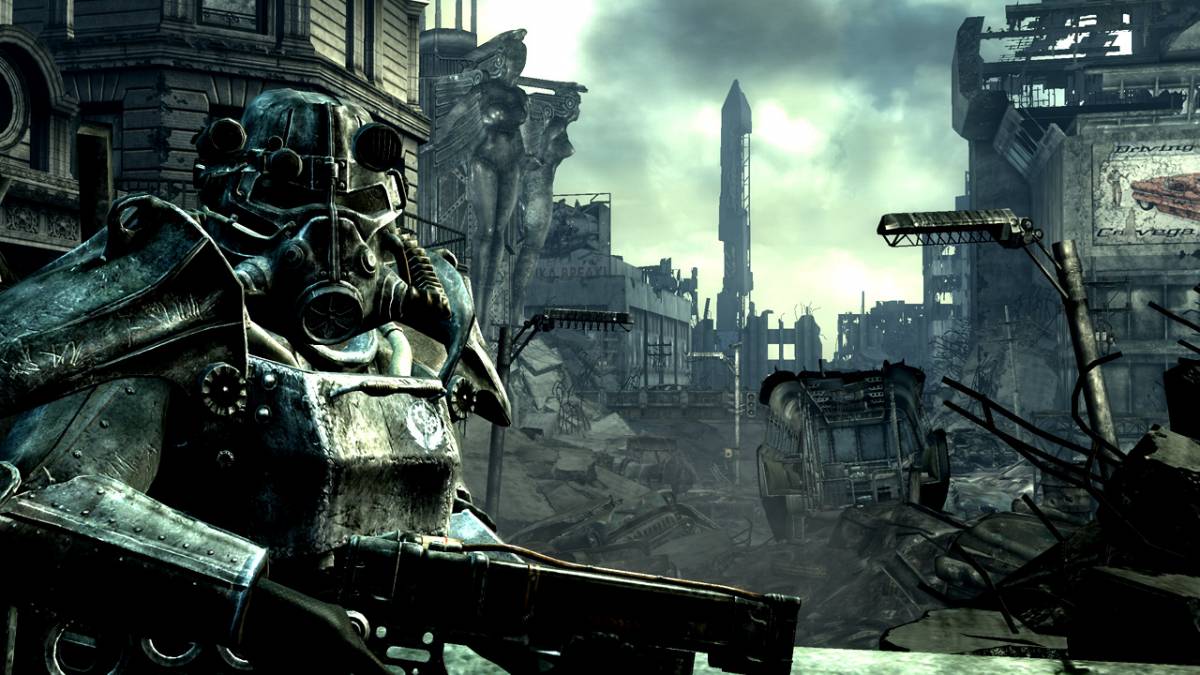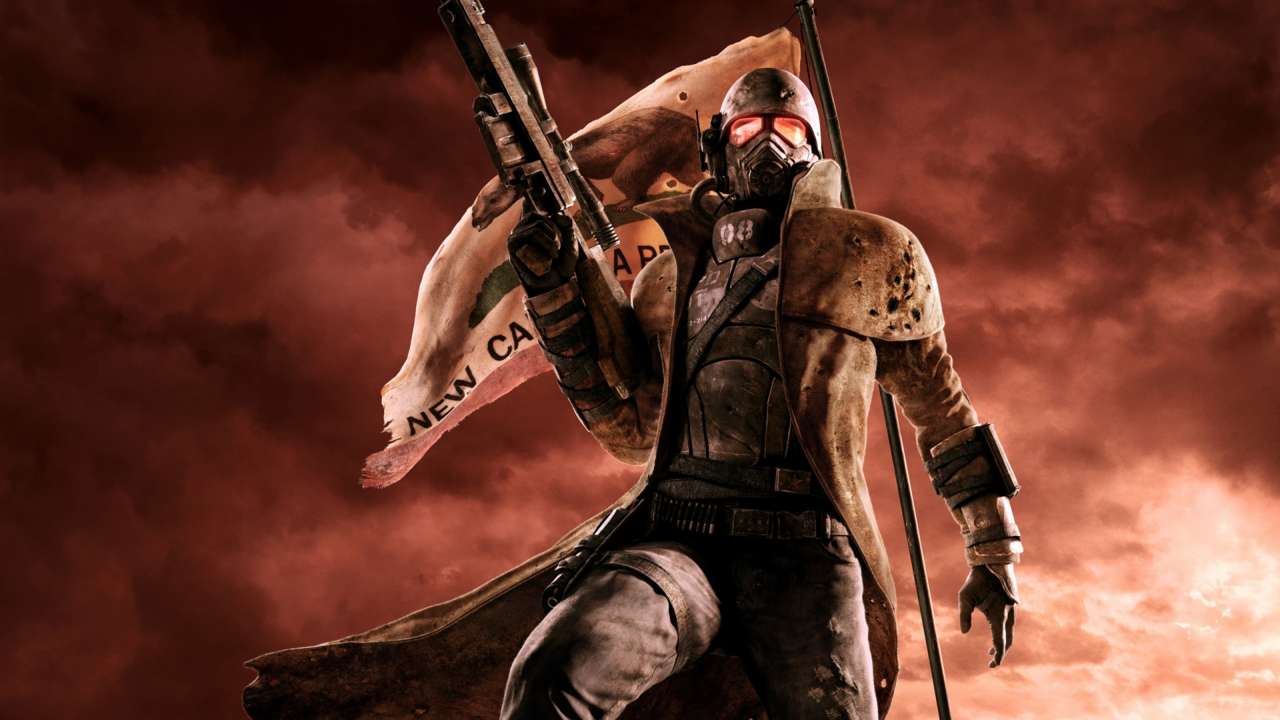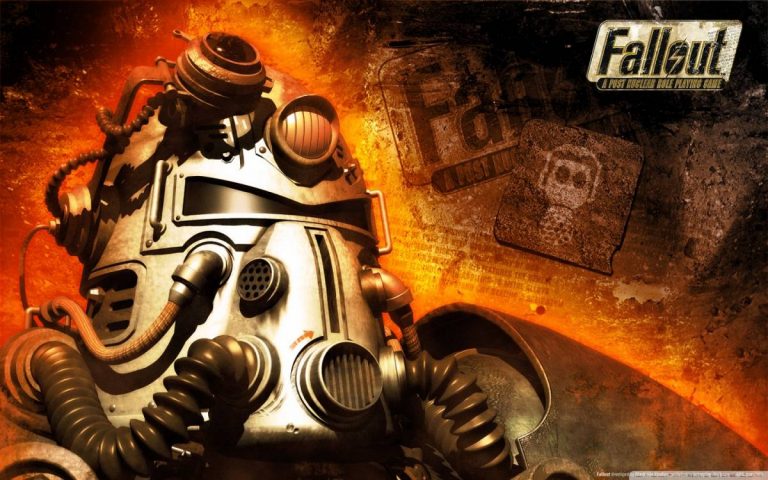“War… war never changes.”
That concept, one that digs into the human predisposition for conflict with a simple eloquence, has carried the Fallout franchise for 20 years to the day on September 30th, 2017. I remember when I was a youngin’ trying to procrastinate himself from schoolwork, strolling through my local EB Games store. I was vaguely familiar with Fallout – my best friend regaled me with the occasional “FALLOUTISEVERYTHING” outburst/rant from time to time. I had seen the box art for Fallout: New Vegas and brushed it off as your typical FPS, a genre I never quite held dear. I had a few bucks to spare and spotted a copy of Fallout 3, or rather, the tinted eyes of power armour spotted me. It was a used copy, on for a meagre four dollars. I figured, “Hey, what the hell…”
Up until this point, my sole experience with “big” RPGs was Bethesda’s The Elder Scrolls V: Skyrim, which I played rather briefly (it was my younger brother’s copy and he was particular about keeping all his games in a neat stack). Before that, my RPG exposure consisted of StickRPG and the occasional online flash game. Skyrim blew me away, as a person who had never played a game like that. The choices, the consequences, the number of THINGS was so exciting. I purchased Fallout 3 expecting a more linear game, but I had faith.

I was immediately in love. Scratch that, there were many moments I fell deeper in love. The moment I woke up in the vault, the moment I got to shoot irradiated cockroaches, and most of all – the moment I exited the vault. No gaming experience, for me at least, parallels the feeling when your eyes adjust to sunlight and you see the wasteland – you feel the desolation, you feel the familiarity. You recognize this unrecognizable world. As you take your first steps, you feel uncertainty and nervousness: “What’s out there?”. Then you discover haphazard walls, something straight out of Mad Max – a town full of ramshackle shops, eccentric people, and a non-defunct atomic bomb smack dab in the middle (as well as its respective cult). In one of these moments, or sometime between them, you realize your place in this world. You’re just a wanderer, a survivor, and you must make something for yourself here. Your place is no place (yet). It was a stark contrast from being enveloped in the inviting beauty of Skyrim. This felt strangely real.
Some of you are probably wondering why I’ve devoted this to Fallout 3 thus far when, y’know, it’s the 20th anniversary of the very original. I’ll get there. Fallout has had different impacts on many people and each experience is exclusive. It’s something nobody else can take from you. Whether it gets you into RPGs, swing music, retro aesthetic, the mechanics of nuclear war, makes you a doomsday prophet (no judgement), or anything else, a Fallout game gives you something that’s uniquely yours.
We have Interplay Productions’ landmark Fallout to thank for all of this. Having acquired the rights to develop games under the GURPS role-playing system, Interplay sought to make a new post-apocalyptic game in the vein of their 1988 RPG Wasteland (for which they no longer had the rights). A couple titles floated around, namely GURPS: Wasteland and Vault 13: A GURPS Post-Nuclear Adventure. Brian Fargo, boss of Interplay, offered the title Fallout, and it was gaming history from there. Taking inspiration from Atomic Age aesthetic and the zany sci-fi at the time (e.g., Forbidden Planet), Fallout developed a retro-futuristic atmosphere that would soon become one of its most iconic trademarks. Fallout’s turn-based combat system took inspiration from X-COM, and the SPECIAL RPG system developed after GURPS licensor Steve Jackson Games took issue with Fallout’s violence. The game was designed to make the player explore and interact with the wasteland and its denizens, to immerse themselves in this shell of a former world.
After three years of development, Fallout was unleashed to the public on September 30th, 1997. The game received rightful acclaim. As multiplayer became increasingly common in RPGs, Strategy Plus praised Fallout as a game that avoids this feature and credited it as a “glowing example of the genre.” Electric Playground addressed the game as, “…without a doubt the best PC RPG game we have played in years. That’s not an exaggeration. Years.” In an era of traditional RPGs falling by the wayside, Fallout crashed the farewell party with swagger to spare. Fallout was, and still is, an amalgamation of everything you could wish for in such a game – it boasts a gripping story (trying to find a water chip for your vault as an army of mutants plots destruction around you), a thematic and tonal atmosphere that swiftly establishes the philosophy of the series, freedom of choice under pressure (your people are dying of thirst, after all), and the general feeling that this is the end of the world and you’re just a part of it.
Whether it’s perusing the various shops in the Hub, helping the farming settlement of Shady Sands, or witnessing monstrous deathclaws roam the desert wastes, there is an aura of, “The world has come to this,” as Mark Morgan’s eerie ambient score pulsates in the background. It’s a lingering feeling and it’s supremely effective. You could make changes for the better, though. You could take this slice of inhospitality and make it work for yourself and the people around you (conversely, you could be a total asshole and the choice is entirely yours). This has permeated the Fallout series since and it’s all the better for it.
Many of those who worked on Fallout moved to Interplay’s Black Isle Studios subsidiary, which developed Fallout 2 (released in 1998). Fallout 2 took the ideas of Fallout then made them, simply, bigger – it is considered one of the greatest RPGs ever produced, ranking #3 on PC Gamer’s “Best RPGs of All Time” list. I could praise Fallout 2 for the rest of this piece, but perhaps that can wait for its 20th anniversary next year. Since Fallout’s inception we’ve seen spin-offs – Fallout Tactics: Brotherhood of Steel (2001) and Fallout: Brotherhood of Steel (2004) – and a change in ownership to Bethesda, who have been responsible for the past three games (though it’s worth noting Obsidian Entertainment developed Fallout: New Vegas and Bethesda served the publisher role).

Back to Fallout 3. I had completed the story in my first playthrough. A slideshow played, reiterating the actions I had taken during my time in the wasteland and their consequences. I played the “good guy” role; the slideshow rewarded me accordingly. Then, blackness (I didn’t own the Broken Steel DLC at the time). The game was over. There was a pit in my stomach, a sense of yearning. In retrospect, it’s a bizarre thing – I was missing a nuclear wasteland. It’s still a bizarre thing regardless of circumstance, I suppose. Now, I know there are people out there who have grievances about the 3D Fallout games (namely Fallout 3 and Fallout 4) and I get it. They are nowhere near perfect.
For myself, though, Fallout 3 was a gateway to this bombed-out world, just as Fallout was to those who were lucky enough to play it first. That gateway has opened myself up to a vast number of stories, all of which bring me a deep happiness when I re-experience them. I owe this to Fallout, the one that started it all.
Thank you, Fallout, for making a wasteland feel like home.
Some of the coverage you find on Cultured Vultures contains affiliate links, which provide us with small commissions based on purchases made from visiting our site. We cover gaming news, movie reviews, wrestling and much more.



